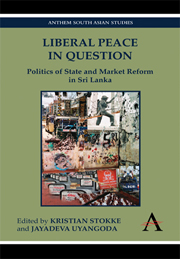Book contents
- Frontmatter
- Contents
- List of Illustrations
- List of Contributors
- 1 Liberal Peace in Question: The Sri Lankan Case
- 2 Travails of State Reform in the Context of Protracted Civil War in Sri Lanka
- 3 Fallacies of the Peace Ownership Approach: Exploring Norwegian Mediation in Sri Lanka
- 4 The Politics of Market Reform at a Time of Ethnic Conflict: Sri Lanka in the Jayewardene Years
- 5 From SIHRN to Post-War North and East: The Limits of the ‘Peace through Development’ Paradigm in Sri Lanka
- 6 Buying Peace? Politics of Reconstruction and the Peace Dividend Argument
- 7 Women's Initiative in Building Peace: The Case of Northern Sri Lanka
- 8 Liberal Peace and Public Opinion
- Notes
- References
5 - From SIHRN to Post-War North and East: The Limits of the ‘Peace through Development’ Paradigm in Sri Lanka
Published online by Cambridge University Press: 05 March 2012
- Frontmatter
- Contents
- List of Illustrations
- List of Contributors
- 1 Liberal Peace in Question: The Sri Lankan Case
- 2 Travails of State Reform in the Context of Protracted Civil War in Sri Lanka
- 3 Fallacies of the Peace Ownership Approach: Exploring Norwegian Mediation in Sri Lanka
- 4 The Politics of Market Reform at a Time of Ethnic Conflict: Sri Lanka in the Jayewardene Years
- 5 From SIHRN to Post-War North and East: The Limits of the ‘Peace through Development’ Paradigm in Sri Lanka
- 6 Buying Peace? Politics of Reconstruction and the Peace Dividend Argument
- 7 Women's Initiative in Building Peace: The Case of Northern Sri Lanka
- 8 Liberal Peace and Public Opinion
- Notes
- References
Summary
Charan Rainford and Ambika Satkunanathan
We have removed the word minorities from our vocabulary three years ago. No longer are the Tamils, Muslims, Burghers, Malays and any others minorities. There are only two peoples in this country. One is the people that love this country. The other comprises the small groups that have no love for the land of their birth. Those who do not love the country are now a lesser group. (President Mahinda Rajapakse, national address on defeating the LTTE, May 19th 2009)
With the apparent military defeat of the Liberation Tigers of Tamil Eelam (LTTE) in May of 2009, the Sri Lankan government was presented with an opportunity to craft a political settlement that would go some way to meet the decades' long grievances of the Sri Lankan Tamil community. But as is evidenced by the speech quoted above, President Mahinda Rajapakse outlined a post-war (as opposed to post-conflict) Sri Lanka ‘without minorities,’ that effectively eschewed ethnicity in favour of a single identity. While effectively denying the need for a political solution, President Rajapakse and members of the regime have equated peace, and stability, with economic development, which they claim will address the concerns and grievances of minorities.
The peace through development paradigm presupposes that economic development is the primary approach to generating peace, by alleviating minority grievances without any explicit state reform. This approach has fundamentally underestimated the overwhelmingly political nature of both peace and development.
- Type
- Chapter
- Information
- Liberal Peace in QuestionPolitics of State and Market Reform in Sri Lanka, pp. 103 - 120Publisher: Anthem PressPrint publication year: 2011
- 2
- Cited by



